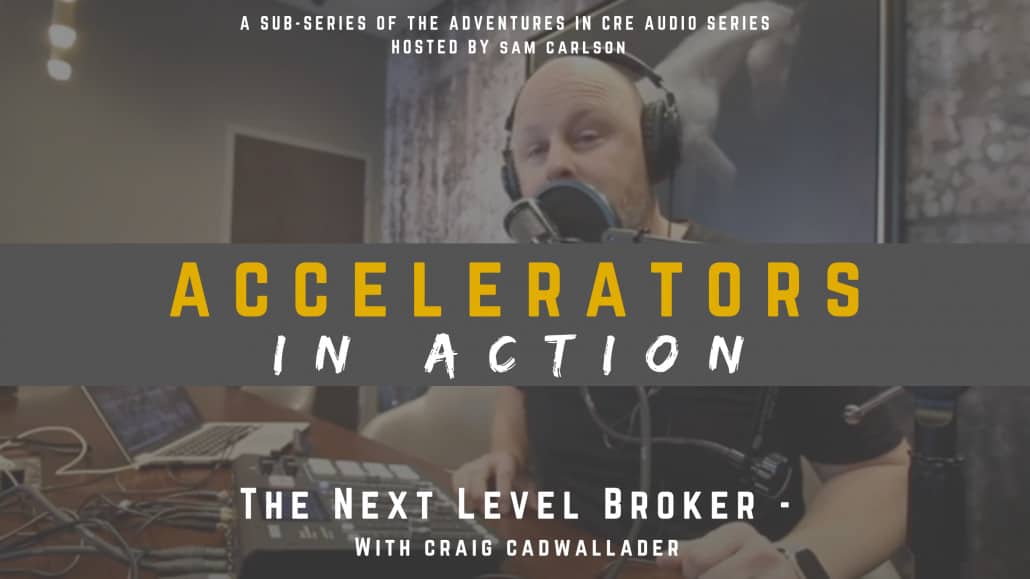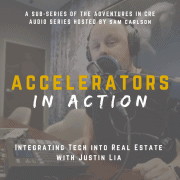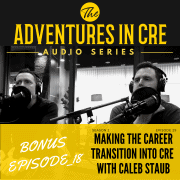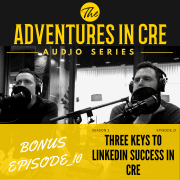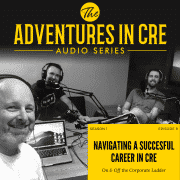The Next Level Broker with Craig Cadwallader – AiA
A lot of incredible real estate professionals have gone through the A.CRE Accelerator and we think sharing their stories will add value to your career. In this episode of the A.CRE Accelerators in Action series, Sam talks with Craig Cadwallader about what he has learned throughout his extensive career in real estate.
In this episode, Craig shares his career path from an undergraduate degree in Communications, Marketing, and Business Management, to asset and portfolio management positions at an established student housing operator, to Vice President of Capital Markets at Avison Young.
Craig offers valuable insights on the importance of proactive communication between buyers and sellers, especially in troubled and uncertain times. His story is one that will resonate with commercial real estate brokers, student housing professionals, asset management and portfolio management professionals, and other commercial real estate professionals looking to enhance their career.
This is the second episode in a growing series of interviews with commercial real estate professionals. This Accelerators in Action series tells the stories of CRE professionals at all stages of their career, from students to senior-level professional. Their experiences will provide you with insights to take your real estate career to the next level.
Listen to this Episode – The Next Level Broker with Craig Cadwallader
Resources from this Episode
- Adventures in CRE: https://www.adventuresincre.com/
- View our CRE Career Resources: https://www.adventuresincre.com/careers/
- A.CRE Accelerator: https://www.adventuresincre.com/accelerator/
Episode Transcript – The Next Level Broker with Craig Cadwallader
Sam Carlson (00:00):
Hello and welcome to Accelerators in Action. Today we’re talking with Craig Cadwallader.
Sam Carlson (00:09):
Making your mark in commercial real estate is a journey best traveled with grit, determination and a mindset to take action. To most, success at the highest levels is a fleeting thought and an unrealistic expectation but to others, opportunity boils down to focus, preparation and a lifelong commitment to learning and improvement. Join me as I take you into the lives of those unwilling to leave their success to chance and instead take complete control of their futures. These are action taking, limit breaking, never faking accelerators in action.
Sam Carlson (00:48):
All right. Welcome back to the podcast. So normally, Craig, normally I’ll say let’s get started but I was so focused on making sure that I pronounced your last name correctly because Cadwallader, I don’t know a lot of Cadwalladers. So anyway, I missed that but anyway thanks for being on the podcast today. Really glad to have you.
Craig Cadwallader (01:10):
No problem, Sam. I appreciate you having me.
Sam Carlson (01:12):
Well, so we’re excited to be here today for a lot of reasons. As you know, if you’re listening to the podcast today, you know that what our goal is is to share the stories and the experiences and the lessons that people can share with our listeners about how they’re taking action and about how they’re achieving success at the highest level and about how they’re planning for that success. So we’re really glad to have Craig on the audio series here with us today and with that I want to introduce you. Maybe you could tell us just a quick little backstory, a little bit of a brief introduction about you, Craig.
Craig Cadwallader (01:55):
Sure. Thanks a lot, Sam. I guess to start just kind of personally speaking, I was born and raised in Raleigh, North Carolina, going to NC state. I got married. I’ve got two identical twin girls as well as two dogs here. On the professional side of things, I think I’ve really been involved with commercial real estate from the onset and I started my career coming out of college and really more or less falling into the operating side of multifamily, really more suited towards student housing at the time. I think it’s almost kind of funny. I think that I ended up… I was perceived as knowing everybody and was very personable and was looked at being a good leasing agent and so that’s how I kind of was asked to join. And then I ended up taking on that opportunity and progressed through the ranks a little bit. Ultimately ended up running my first deal shortly thereafter.
Craig Cadwallader (02:55):
But from the earliest point in my career, I’ve always had a particular interest in development space and I was recruited after a couple of years having successfully run my first first [inaudible 00:03:07] deal now, trained several property managers, to move over to work with a developer and an owner operator who was transitioned to property of a market rate deal to a student housing property as part of their value add strategy.
Craig Cadwallader (03:22):
At the time, the plan was to rehab that property and to a tune of a budget of five and a half million dollars and then on completion we’d sell the asset and I’d transition over to the development side of the business. So that’s where my interests really kind of evolved to that point in time. But as luck would have it, of course, at the time that was all about ’07, ’08 when our last financial crisis happened.
Sam Carlson (03:48):
I was going to say nothing happened then.
Craig Cadwallader (03:51):
Yeah. Right. Which unseemingly feels a little bit sometimes like today does.
Sam Carlson (03:57):
It’s… Yes.
Craig Cadwallader (03:59):
But our development team [inaudible 00:04:01] at the time, the property was held and luckily I still had a job and ended up staying with the operating side of things, would carry the property through that downfall and over the next couple of years and property was incredibly successful during this period. We crushed all of our projections year over year even coming out of that downturn.
Sam Carlson (04:21):
Which is amazing. Which is amazing. I mean, yeah, I mean most people come in 2007 to ’08 going through all that and exceeding your projections. That’s incredible.
Craig Cadwallader (04:32):
And I think a lot of it had to do with we were a strong student market, we were a strong property and I mean we came out at the right time so we just kind of restructured things and pushed forward.
Craig Cadwallader (04:46):
But throughout this period of time, I held on, I helped on various assets, picked up some others, got some promotions and so forth. Some of the properties were on the student housing side, some were on the market rate side, some were value add and then there were some tax credit receiverships which really weren’t my favorite. And also some lease ups as well which are the more glamorous ones I guess you could say. But kind of wide variety of product type, all multifamily focused.
Sam Carlson (05:20):
Okay. And so today, what do you do today? What is your direction today?
Craig Cadwallader (05:25):
Yeah. So with that, so all of this time I didn’t see myself staying in this area forever. What I found was I never really understood why at the time the operation guys were… I felt like a lot of times we were given a performance and said, hey, make this work. Now granted, I’ve learned through recent years, it’s a competitive space and sometimes you got to tighten those numbers as much as possible to win the deal. But I also found that the operations guys were not really brought into the conversation so much as the investment asset development guys were. I just wanted to be more involved in deal mechanics. And so with that, I kind of saw it as an intermediary step to the development world. Brokerage as a middle ground kind of worked with all parties. And it could be either something I’d certainly enjoy or it could be a middle step to the development side of things. And I think the jury’s a little bit still out [inaudible 00:06:27] that but it’s been a good transition.
Sam Carlson (06:31):
Well that’s wonderful. And as far as that, I mean obviously there’s a lot of things happening right now and I’m sure that’s shaping some of your decisions and some of what you’re doing. Maybe talk a little bit about how you’re adapting and the different things you’re doing right now currently as a broker.
Craig Cadwallader (06:53):
Well, I think one of the biggest things right now is being focused on your current clients that you’re working with and communication is essential. Organization is essential and really being able to kind of dig in on what makes sense. And I think some of that is on the financial analysis side. Some of it is also knowing where the banks are right now. I mean right now the lending environment can be a challenge and so having somebody that is able to navigate that course. I think we’ve got a team that’s able to do that.
Sam Carlson (07:37):
So talk to me about your team currently. When you are working your day to day, maybe describe a little bit of the team dynamic you work with and I think one of the things too is any time that you’re going to the next level, that you’re doing these different things, it’s all about what are the skills that I’m going to need. And I think that’s a big topic of conversation today even what can you do today. What are the skills that you need in a team dynamic and what you’re doing and how do you manage that? Do you understand what I’m asking? As far as like what were the skills you needed and then today what are the skills you’re working on?
Craig Cadwallader (08:15):
Yeah [inaudible 00:08:16] I think the accelerator program is one dimension. I think right now one thing that I found myself, and this is kind of leading into the question here, one thing I found myself was that coming from the operating side of the business, the need to understand how to underwrite the deals were something I personally just wanted to know how to do better. I didn’t want to necessarily rely on just the analysts putting together some numbers and say, “All right, well here are the projections.” So what the deal [inaudible 00:08:50]. I wanted to be able to fully be able to digest the material and say, “Well, all right, well here’s my assumptions on income and expenses across the categories.” Looking at your debt coverages, looking at returns and seeing how do I put this together and it makes sense first to me but also to the investor that we’re working with. This was my personal thing. I don’t always like to rely on somebody. I like to be able to have my own and be able to pass that data.
Sam Carlson (09:23):
Well, and I think a big part, I mean in the brokerage world, your job is to bring in transaction to fulfillment. Correct? Right? And go ahead.
Craig Cadwallader (09:34):
I was going to say no, you’re absolutely right. It’s bringing in deals but you also want to go stand behind the deals that you’re working with, too.
Sam Carlson (09:39):
Yes. Yeah. That’s your reputation. That’s that relationship thing. Right?
Craig Cadwallader (09:43):
Correct.
Sam Carlson (09:43):
And one of the things that even myself and my own that I’ve learned to be true, and I’m guessing you can speak a lot to this, is in the brokerage world, you can either sell or you can advise. Right? And the difference, a person selling is a salesman. A person advising is an expert, right?
Craig Cadwallader (10:09):
And you’re absolutely right. You hit the nail on the head. I mean we consider ourselves advisors more so than salespeople.
Sam Carlson (10:16):
So what’s that… I mean because I think that takes a lot of people. That’s a nuance that most people do not understand. And I’m wondering if was there a time when you pivoted from the operations side into the brokerage side to where it wasn’t that natural of a transition or was it always, did you always know that?
Craig Cadwallader (10:41):
I mean I’ve always been a very personable person. So I mean having [inaudible 00:10:46] conversation with somebody is not that hard for me but also the view we look at is we look at it as a client first mentality and a team approach. And so with that, that client first attitude is whether this is the time for them to sell the deal or not or maybe it’s six months from now. What is in the best interest of the client? I think you have to look at it as more of a holistic approach as opposed to a single transaction. Because I mean we’re not in it for a single transaction. We’re in it for the relationship and really to build the rapport [inaudible 00:11:28] and I mean deals will come with that. And then we all, like I said team-wise, we don’t focus on it single handedly. If I’m not the right guy, I’ve got somebody on my team that’s better suited at it or vice versa. We’ll bring each other in to help accomplish [inaudible 00:11:47] the overall task for the client.
Sam Carlson (11:49):
Yeah. Not to take too abrupt of a turn here, but we kind of passed over or grazed over something really spectacular that we didn’t spend much time. So in 2007-2008, you were in charge of leasing up and the performance, the operation of a project and it performed beyond your projections, your initial projections before any of the recession then. And I’m just thinking now, I’m like we should probably talk about that a little bit. How did you actually do that? What were some of the… When you guys were there, I remember what it was like in 2008 at that time. It was not a confidence driven market. We were not all excited, but I’m guessing you guys were able to do that because you maybe found a new way to look at it. So maybe share that story a little bit. I’d love to hear more about that experience.
Craig Cadwallader (12:52):
So for that particular project that I was working on in ’07 and ’08, that was a student housing deal. It’s a little more insulated than some of the market rate housing because during a time when the economy usually takes a beating, education is something that a lot of folks go back to and I mean that in all capacities of an education. And so typically, and I can’t speak for the universities, but typically you will see an influx of applications during those periods. And so with that, we still continue to see leasing traffic. We’re still continuing having folks sign. We had just at that point in time put a five and a half million dollar renovation on this property that we just converted from market rate to student housing. So it was fresh. It was new. Students were very excited about it still and they also had the backing of their parents. Now with that, mom and dad may have had a little more skepticism about writing checks just in the instance of the economy but needless to say we were able to hit all of our numbers and we continued to aggressively market things since we could not sell property.
Sam Carlson (14:19):
Did you have to make any changes? I mean when you guys went in, I’m sure you had a specific budget, you had a specific plan, marketing, leasing, all that stuff. Was that all… Were you stable because of the market that you were in or did you have to make some changes that required some ingenuity here?
Craig Cadwallader (14:39):
I think that for that particular property and the market that we were in, I think we were insulated because Raleigh has been a strong student housing market nationally and it’s continued to be and I think at the time, one of the things that obviously has been evolving over the years, but at the time you had student housing deals that all had transportation that went to and from campus. We had shuttles that went to and from campus. Now you’re starting to see a little bit of a trend where some of these guys are now trying to get closer to campus from a walkability standpoint. So I think its market changes both in the market itself but also on a national spectrum, too.
Sam Carlson (15:30):
Yeah. Well that makes a lot of sense. And maybe we’ll kind of… I think right now it’s really interesting what you said earlier was we’re in a relationships business, right? I think one of the ways you interface with clients and people that you work with is all about how can you provide value to them? Because really at the end of the day, and that seems like a platitude to a lot of people, but the reality is, is when you understand the difficulties that people are in and you can solve those problems, then you become invaluable and you become insulated just like you guys were in that project, that student housing project. So I think 2008 has come and gone. We are in an interesting situation today and I would love to get your perspective on some of the plans and how you’re adapting and even the relationship side of your business. How are you nurturing those relationships? I know I’m throwing a lot at you. I’m kind of… I’m really interested to see how as a broker you’re pivoting and you’re adapting to the current environment.
Craig Cadwallader (16:57):
Sure. With it, I think right now, and we kind of look at it a few different angles, we look at it from an existing product as well as from a development standpoint as well on the land acquisition side. And so we’re tending to see on the land acquisition side, a lot of folks are still chasing opportunity there, which is good. Part of that is because these sites, from a redevelopment standpoint, take so long to go through the entitlement process sometimes. And I’m not just talking about locally, I’m talking about regionally and even larger than that.
Craig Cadwallader (17:41):
And then on the acquisition front, I think you’re seeing some groups that are saying press pause just to kind of see where the market is. Are there going to be any rebalances of pricing expectations? But I think what’s going to happen though is I think you’re also seeing opportunistic groups that are saying, “Hey, while everyone else is pressing pause, I’m going to go out and I’m going to actually pursue an opportunity.” And so you’re seeing a little bit of both.
Craig Cadwallader (18:15):
As far as the existing relationships, a lot of it is just reaching out to folks and just checking in on them. Really with no agenda in place other than, “Hey, how are you? What’s going on? What are you seeing differently? Is everybody okay in your group? Is there anything we can help on?” And so I think a lot of it’s also just nurturing those relationships like you said. And then, like we’ve got a full capital markets team on the finance side, too. So we’re also reaching out to find out where are the lending environments at, both from the banks, from the life coach, from the agencies. What’s the kind of current statement with each because obviously most of these deals are going to take financing to make work.
Sam Carlson (19:10):
Well, it’s interesting. I don’t know who to attribute this quote to, but he or she said, “With lack of information, people tend to make up their own.”
Craig Cadwallader (19:26):
It’s a good quote.
Sam Carlson (19:27):
Yeah, I can’t… I’m sorry, whoever, if you know who said that and you guys want to write that in the comments.
Craig Cadwallader (19:34):
I don’t but you’re right.
Sam Carlson (19:35):
Well it’s so true because right now we find ourselves in a little bit of a pickle as far as the economy and investments and things like that. A month ago we all were kind of going about business as usual and today is not as usual. And I think a lot of people, our human mentality, the dynamic we have is such that we kind of default to the worst case scenario and so we start making up these dialogues which aren’t necessarily based on reality.
Sam Carlson (20:09):
And so if your real estate is a relationships business and if you, like you, are being very smart, if you have those relationships and those people that you’re working with, even if you’ve got nothing to share, nothing of substance, you might not consider it to be of substance. The sheer fact of communicating with people, whether they’re in transactions right now, maybe they’re in a deal right now or maybe they’re not, they’re just kind of waiting on the sidelines, whatever. If they’re in that pool, those are people that if you want to talk about who’s going going to win coming out of the backside is because anytime there’s any kind of event like this or a recession, there’s always opportunity on the back end. The people that win are the people who have some sense of leadership that have really taken that initiative. Have you seen that same thing in your career?
Craig Cadwallader (21:13):
Yeah, I think leadership, persistence, active communication are all key areas that are critical coming out of a period like this.
Sam Carlson (21:25):
Yeah. So a couple more things and if you have anything you want to add to this, I did ask you a couple of questions before this. I want to talk about the skills. I know you talked about the accelerator, which is great, but I want to talk about some other skills that are essential for taking your career to the next level and kind of following that path. If you could give advice as far as a couple of key skills and where people are really needing that development, what kind of advice or what routines or what do you see as a critical part of success?
Craig Cadwallader (22:09):
I’d say, and I know I’ve already mentioned this, but I would stick with communication and organization as essentials. Also having a sound understanding of the financial metrics and your returns. It just makes you that much more valuable to a project and a team. I think those are probably my best words of advice I guess you could say. What’s critical.
Sam Carlson (22:38):
Organization, good communication skills. Absolutely. That makes sense.
Craig Cadwallader (22:43):
Absolutely. Because typically, I mean [inaudible 00:22:44] we’ve got a multitude of different projects that are in play at one time and so being able to decipher and know what can and cannot be shared and what goes with what. I think that organization is key.
Sam Carlson (23:04):
Yeah. One thing you said in this podcast here that I just think is so important and I think anybody listening can take a minute to reflect and either take direct advice from what you’re sharing or even take a minute to reflect on what are the things is just being the expert. Shifting from providing advice to away from selling something. And I think that makes a ton of sense. You obviously took the initiative to learn modeling skills, but you’ve also got a ton of instances where you have just up-leveled your skills to be the go to resource for the people. You call them clients, coworkers, people you’re working with. Correct?
Craig Cadwallader (23:54):
Sure. You’re absolutely right. I mean just me personally, I always like to improve on what I’ve got and continue to learn more and more along the way. So I think educating yourself is critical no matter what point in time you’re in, whether it be in college, out of college or mid career.
Sam Carlson (24:15):
Yeah. Well, Craig, it’s been awesome talking with you. Do you have any parting words of advice? Anything you want to share with the audience before we conclude here?
Craig Cadwallader (24:24):
A couple of things. I’d say and take them for what you will, but I think whatever you’re doing you have to enjoy what you do. Just as importantly, the people you’re with. You spend a lot of time with those folks. So be sure you like them and hopefully they’ll like you. I think that’s one thing. And help others as you can. Don’t be stuck in your ways. At the end of the day, it’s the people and relationships that help you along the way and I think be willing to listen. Take advice and network with others and again continue learning. I think it’s important.
Sam Carlson (25:05):
That’s good advice. Craig, thanks again. And for everybody listening today, thank you so much for tuning into the podcast and we will see you on the next one.
Sam Carlson (25:15):
Thank you for tuning in to this episode of Accelerators in Action. For show notes and additional resources, head over to www.adventuresincre.com/audioseries. Would you like to learn real estate financial modeling in a matter of weeks and do it with zero guesswork? If so, the ACRE accelerator is for you. The accelerator is a step by step case based program designed to teach you exactly what you need to know and in the order you need to know it so you can gain both the knowledge and experience to take your career to the next level. To see if the accelerator is right for you. Go to www.adventuresincre.com/accelerator.

